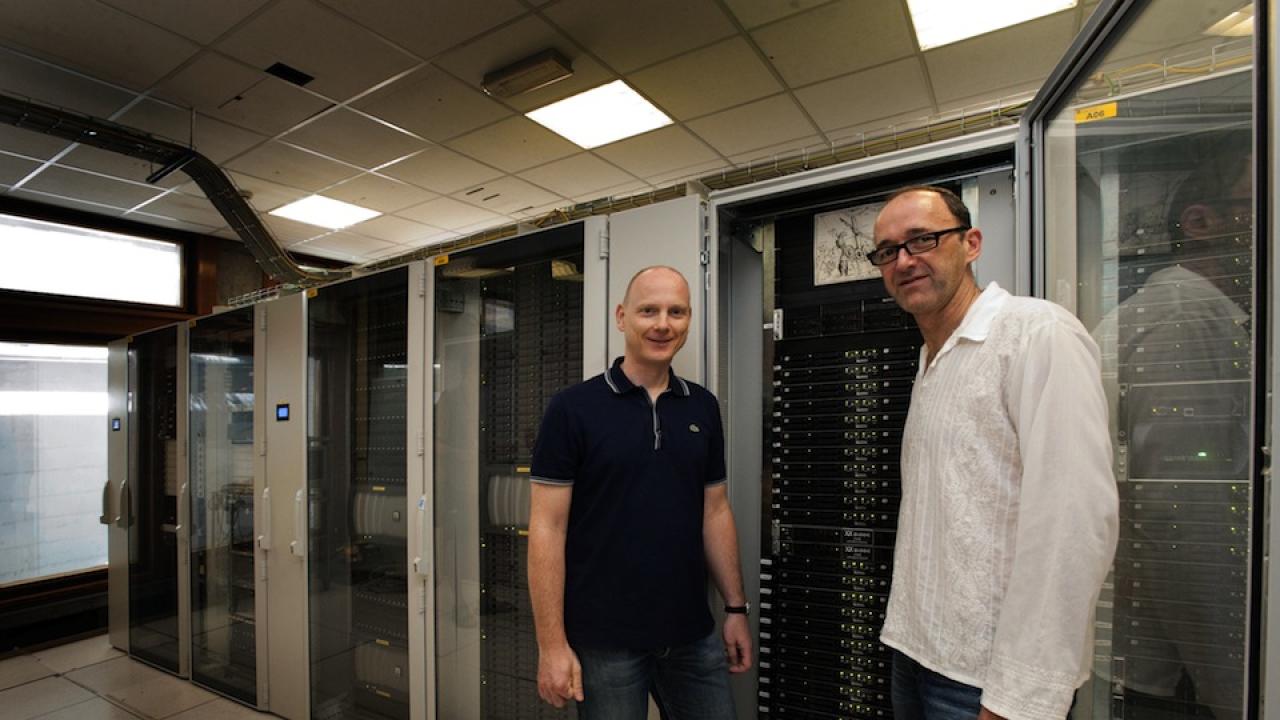
ICTP has recently opened up two new research programmes that will expand its research areas to include new cutting-edge uses for computer modelling. One explores ways to sustainably draw energy; the other looks into ways to computationally gauge the behaviour of biological systems.
Do or Dye
Drawing energy from renewable sources is a worldwide challenge because it is difficult to make green energy economically viable in a sector dominated by entrenched, polluting industries such as fossil fuel power. But it is an issue in particular for developing countries, which are often cut off from renewable energy technology. One example is solar power. The critical issue with solar power, even in the developed world, is that it costs too much to make solar cells. The solar energy market is dominated by silicon, and silicon cells are expensive because of the heavy technical work it takes to purify the silicon and grow near-perfect crystals. "Silicon itself is extremely abundant-it's one of the most abundant materials on earth," said ICTP research scientist Ralph Gebauer. "But purifying it to this precision and making these crystals into wafers, it's a huge effort and therefore it's very expensive."
There are two ways of confronting this affordability problem: Scientists can work to make silicon cells cheaper, or they can keep hunting for alternative ways to harvest the Sun's energy. It's the latter solution that Gebauer's new computational material sciences project on energy and sustainability is tackling. His research tests new methods for drawing and storing energy by modelling functional materials using supercomputers.
For example, Gebauer and his colleagues are computationally testing dye-sensitized solar cells. Dye molecules absorb light well, and transfer the energy from that light to a semiconductor, made of a common material like titanium dioxide. These solar cells don't need any 'pure' material, like the silicon cells, so they're not difficult or expensive to make. Dyes can even be acquired from everyday sources like fruit juice if needed.
But, while they are cheap to make, dye-sensitized cells are not yet marketable compared to silicon. The dye-sensitized cells don't convert the Sun's energy efficiently. They're also less durable than silicon-based cells. "The truth is it is extremely difficult to compete with silicon because silicon has become a mega-billion industry," said Gebauer. ICTP's energy project is hunting for ways to make dye-sensitized cells more efficient using computer models of molecular interactions. This is not only good for the overall solar market, said Gebauer, but it's particularly good for developing countries for whom high-priced solar cells are simply out of reach. Computer modelling is also less expensive than many other kinds of technological experiments, because only readily available computers are needed rather than sophisticated experimental devices. So scientists from developing countries can still make a contribution to a large scientific field even if their funding is low.
ICTP also functions as a way to form connections between scientists, Gebauer said. Scientists in developing countries are often isolated. Two African researchers, for example, can live in neighbouring countries and be working on similar things but not even know of each other. "Sometimes people meet here at ICTP and then group together," he said. "Networking people is a very important aspect of what we're doing." One such example is ANSOLE, the African Network for Solar Energy, which Gebauer noted has more than 300 scientists already, and had its first meeting this February in Cameroon.
The Math of Life
Ever since scientists first sequenced the human genome about a decade ago, biological data of unprecedented quality and detail has been pouring in. This change has spurred more researchers with quantitative backgrounds, such as physicists and mathematicians, to explore the study of biological systems.
But the field is expanding so fast that researchers from developing countries are being left behind. This isn't just bad news for those researchers, but it's bad for the field, which would benefit from the inclusion of more minds from diverse backgrounds. It's also bad for developing countries, which would benefit from using quantitative biology to fight issues relevant to them, such as malaria.
So ICTP has launched a new quantitative biology programme, and aims to eventually establish a whole new, independent section in the field. This new effort is coordinated by theoretical physicist Matteo Marsili. For the time being, said Marsili, since we do not have an expertise in quantitative biology, ICTP is putting together a network of experts in the field to run research and training activities. ICTP will hold its first Winter School on Quantitative Biology in late November as part of its efforts to expose more scientists from the developing world to this exciting and fast-growing field.
ICTP has a tradition of interdisciplinary activities in other fields, such as mathematical ecology, economics and computer science. All these disciplines pose challenging conceptual problems that attract theoretical physicists. For example, in medicine, a cell may respond to a drug you want to study, but it is simultaneously responding to everything else in its environment. So, a physicist would try to remove the noise from 'random perturbations' that get in the way of studying the effects of the drug. Theoretical physicists have also been known to study economics and the dynamics of financial markets. For example, they might ask what caused the cascades of bank defaults in the recent financial crisis.
ICTP has served as a hub for scientists in developing countries to be linked to front line research in these fields. Likewise, ICTP aims at doing this in Quantitative Biology: "If we don't manage to help them in this respect, then we are not really properly serving the scientists in developing countries," said Marsili. "They will look for these things elsewhere or they will lag behind."
















